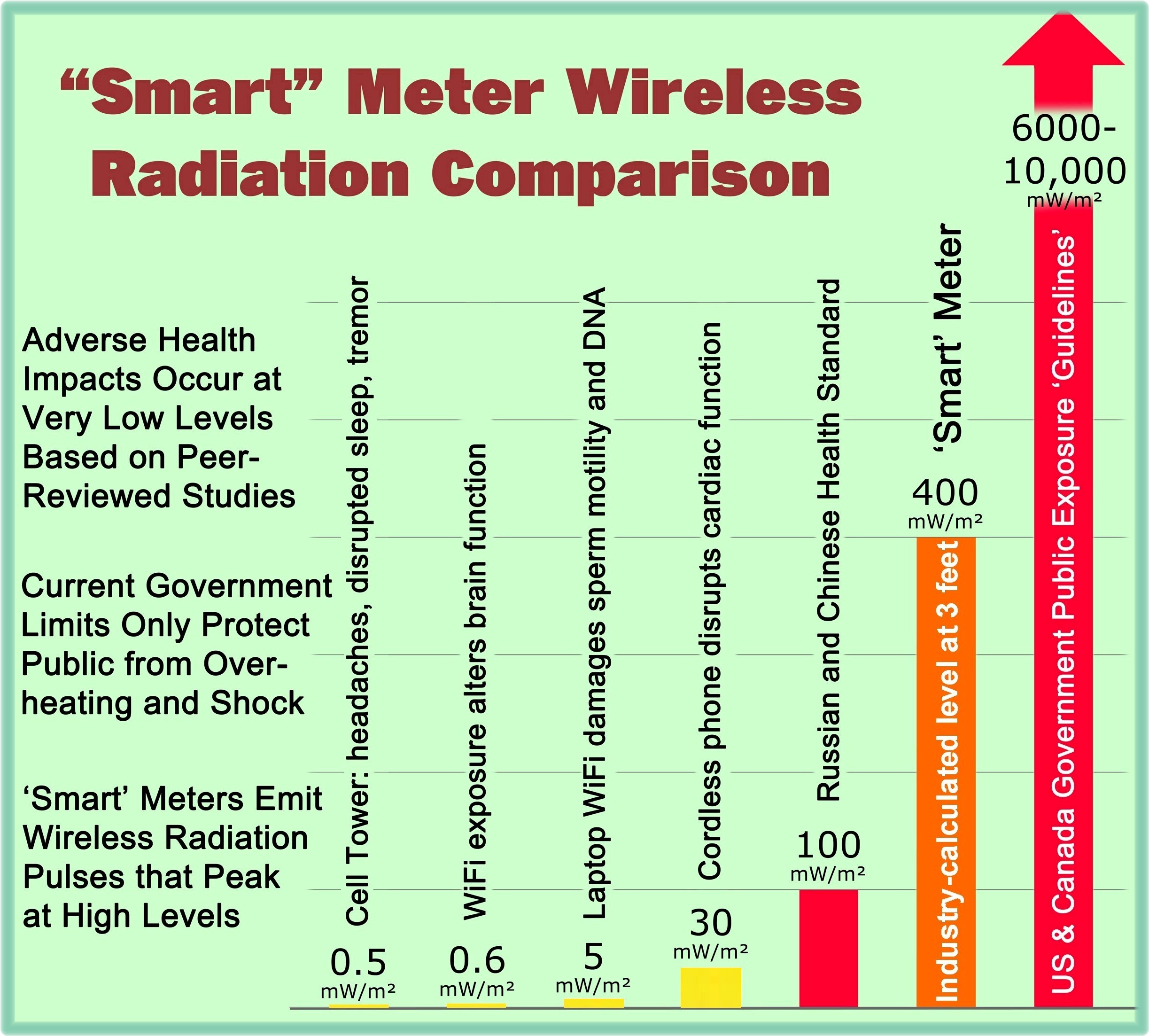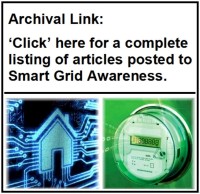by K.T. Weaver, SkyVision Solutions
 Yesterday the Maine Supreme Judicial Court affirmed the judgment of the state’s Public Utilities Commission (PUC) that wireless smart meters are safe enough to be installed upon customer homes and that fees associated with opting-out are reasonable and not unjustly discriminatory.
Yesterday the Maine Supreme Judicial Court affirmed the judgment of the state’s Public Utilities Commission (PUC) that wireless smart meters are safe enough to be installed upon customer homes and that fees associated with opting-out are reasonable and not unjustly discriminatory.
The Court decision was made in spite of the fact that one of the PUC Commissioners had included the following language as part of a December 2014 PUC Order:
“Thus as part of the safety finding, there is a low cost or no cost accommodations to recognize that there is some credible evidence of risk of chronic effects. I find it is not a reasonable utility practice for CMP [Central Maine Power] to fail to provide sufficient risk mitigation and that CMP should provide an AMI meter with a transmitter turned off if recommended by a licensed doctor or medical practitioner.”
The above statements were at the heart of the latest Court appeal and questioned how it could legally be justified that “fees associated with opting-out are reasonable and not unjustly discriminatory” when “there is some credible evidence of risk of chronic effects.”
The Court appeared to agree with the statements of the Maine PUC that:
“[I]t is one thing to make a finding that evidence is credible regarding potential harm and quite another to find there is a legally credible threat of harm — that a credible threat of harm is in fact credible: likely and probable to result in harm.” (Emphasis added by the Court)
If it takes you a few reads of the above statement in an attempt to understand it, you are not alone.
One must realize, however, that there is historically a high bar in the U.S. court system to return a favorable decision on health issues. I am not a lawyer but have found that the court looks for not only a credible threat of harm but that the threat must also be “imminent” and/or there must be specific injury claims that can be attributed to the offending agent. The Maine Supreme Court used the language that “the threat of harm must be probable and convincing.” The Maine Supreme Court also stated in its decision that:
“The Commission appropriately applied the credible threat standard such that it evaluated ‘what threat or hazard constitutes an acceptably safe level of exposure,’ balancing the potential for harm against the usefulness and pervasiveness of the technology at issue.”
The above statements notwithstanding, in this case, I thought the Plaintiffs had a reasonable chance of success as the issue should have been about whether the evidence in the PUC and Court record justified charging customers a fee to refuse smart meter installations when “there is some credible evidence of risk of chronic effects.” To me, no fee is justified. What do you think?
Finally, the following statement in the Court’s decision is troubling:
“The Commission, therefore, properly rejected Friedman’s approach because it would require an impractically high threshold for ensuring safety, and as a result would render nearly all utilities unsafe.”
So if an approach is “impractical,” there is no need to ensure safety? And what is “impractical” and who decides what is “impractical”?
Addendum
Beware of declarations that “Maine’s high court confirms smart meters pose no health threat,” as tweeted out by news organizations such as https://twitter.com/sunjournal/status/692394165091463168. How does that headline “square up” or reconcile with the PUC Order containing the statement that “there is some credible evidence of risk of chronic effects.” ?
———————-
Press Release from: Maine Coalition to Stop Smart Meters
Law Court Turns a Blind Judicial Eye to Smart Meter Arguments
Today, culminating a four year legal and regulatory battle over the health and safety effects of smart meters, the Maine Supreme Judicial Court [the Law Court] affirmed a Maine Public Utilities Commission [PUC] decision that smart meters were essentially safe enough. Given the well documented utility industry influence on the agencies supposed to regulate them [Alster, 2015], and the Courts stated deference to the PUC, anti-smart meter activists were disappointed but not surprised.
The appeal brought by Ed Friedman and others, argued the PUC in reaching their decision applied an improper standard and burden of proof, was not supported by substantial evidence in the record and that the two Commissioners offered extremely different arguments not resolved in their ultimate decision, thus making it arbitrary and capricious. Even though the legal burden was on Central Maine Power to show smart meters were safe, the Court decided to ignore this question since they found the Commission decision supported by substantial evidence in the record.
To view the rest of the press release, here is a PDF link: Smart Meter Decision Press Release 1-26-16
Source Material for this Article
“Maine high court rejects claim that smart meters are unsafe,” January 26, 2016, at http://bangordailynews.com/2016/01/26/business/maine-high-court-rejects-claim-that-smart-meters-are-unsafe/
Decision from the Maine Supreme Judicial Court, Ed Friedman v. Public Utilities Commission et.al., January 26, 2016, available at https://smartgridawareness.org/wp-content/uploads/2016/01/2016-maine-decision-for-friedman-v-puc.pdf
“Oral Arguments to be Heard this Week by Maine Supreme Court in Smart Meter Case,” November 2015, at https://smartgridawareness.org/2015/11/01/oral-arguments-to-be-heard-this-week-in-smart-meter-case/
“Court Appeal to Maine Regulator’s Decision that Smart Meters Are ‘Safe Enough’,” May 2015, at https://smartgridawareness.org/2015/05/13/court-appeal-to-maine-regulators-decision-on-smart-meters/





This is no surprise. Gota remember all f this stems from Obama’s 2009 energy independence order that was not voted on by congress or the senate. The AMI system and all it is going to be able to do will give supreme control over every single person who has one to the point where the entire electrical grid is like the internet but with power instead of data. Private solar systems in people’s homes will be remotely accessed and switched on or off or Dirty power backfeed across dc busbar to fool it into thinking the panels are suppling the voltage so reactive power can be dumped off the feeder to balance the overall power quality or the energy stores up in battery banks stolen to create reactive energy should it be needed to object into re feeder to balance the overall power quality. Or during high peek demand times take to support the grid should it be needed also electric vehicle battery systems will be used too. Add the fact that every new smart regrigerator, air conditioner, washing machine, dryer, dishwasher, hotwater heater, and other electrical devices will be sent demand signals to limit there port usage that they will use to ale sure power deand will never become more than the total suppled power which could overload the grid causing. Black out. Never mind if 14% of people are harmed from them the other 86 won’t be and the benefit to government will amount to meeting the agreed reductions Obama agreed to the international community the U.S. would achieve along with the billions the government Wil save from not building more power plants.
So no I’m not surprised when my Solar was on at 4 and 5 am getting reactive pwer dumped into it or taken depending weather the feeder I live in had to much or not enough. Of yet took my stores power in my batteries they would remote power off my inverter then emote power it in which defaulted to recharging my battery bank from the utility comany instea of charging from my 36 280 watt solar panels. I had remote power downs in morning then early to mid afternoon a remote power up restarted inverter that immediately began buying power. I had the highest power usage ever recorded since my family began service in 1978 and I live alone So the government will do whatever it wants to no matter who may be harmed.
My smart meters were used to steal from me and I had two one for the solar system production and the second called the billing meter. I was lies to and told prior to buying and installing $44,000 system that NO SMART METER would be used on my property
Unfortunately it seems as though they can’t be beat in court so far. The power and influence of their lawyers, the same ones that enforce a total media blackout for the last six years, is too great. City councils and county boards are the only ones to stand in their way with ordinances that ban “smart” meters or regulate wireless transmittiers and antennae in their cities.
Indeed a travesty of justice. The SwissRE have categorized wireless technology in their highest risk category, which would indicate that future health issues will be clearly evident based on independent researchers’ disclosures and not industry hacks.
Dear Readers,
It seems to me that the court decision is not only capricious but plainly corrupt. I allege that someone in the Microwave Industry is greasing the palms of the judge or judges, or to put it more plainly, I allege that someone in the Microwave manufacturing and sales industry is putting money into the back-pockets of the judge or judges who seem to me to be CORRUPT !
Safe enough is absurd. As more and more people are getting sick from these stupid and poisonous machines it’s plain that these machines are not SAFE !